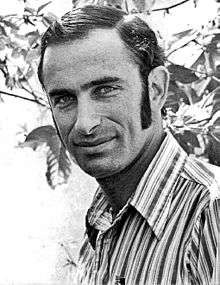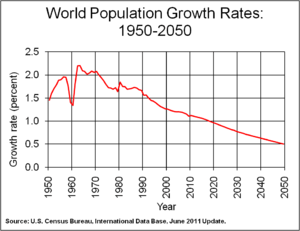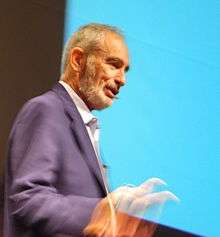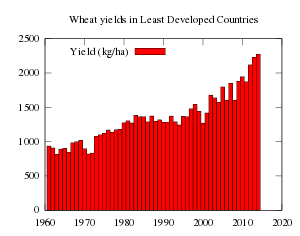Paul R. Ehrlich
| Paul R. Ehrlich | |
|---|---|
 Ehrlich in 1974 | |
| Born |
Paul Ralph Ehrlich May 29, 1932 Philadelphia, Pennsylvania United States |
| Residence | Stanford, California |
| Nationality | American |
| Fields | |
| Institutions | Stanford University |
| Alma mater |
|
| Thesis | The Morphology, Phylogeny and Higher Classification of the Butterflies (Lepidoptera: Papilionoidea) (1957) |
| Doctoral advisor | C. D. Michener |
| Known for | The Population Bomb |
| Notable awards |
|
| Spouse | Anne H. Ehrlich (married 1954) |
| Children | Lisa Marie |
Paul Ralph Ehrlich (born May 29, 1932) is an American biologist, best known for his warnings about the consequences of population growth and limited resources.[2] He is the Bing Professor of Population Studies in the Department of Biology at Stanford University and president of Stanford's Center for Conservation Biology.
Ehrlich became well known for his controversial 1968 book The Population Bomb, which asserted that the world's human population would soon increase to the point where mass starvation ensued.[3][4] Among the measures he suggested in that book was population control, to be used in his opinion if voluntary methods were to fail. Ehrlich has been criticized for his views; for example, Ronald Bailey called Ehrlich an irrepressible doomster.[5] On the other hand, Carl Haub observed that Ehrlich's warnings had encouraged countries to take action to avert disaster.[6] Ehrlich has acknowledged that some of what he had written had not come about, but holds to his view that overpopulation remains a major problem.[7]
Early life, education, and academic career

Ehrlich was born in Philadelphia, Pennsylvania, the son of Ruth (Rosenberg) and William Ehrlich.[3] His father was a shirt salesman, his mother a Greek and Latin scholar.[8]
Ehrlich earned a bachelor's degree in zoology from the University of Pennsylvania in 1953, an M.A. at the University of Kansas in 1955, and a Ph.D. in 1957 at the University of Kansas, supervised by the prominent bee researcher C.D. Michener. During his studies he participated in surveys of insects on the Bering Sea and in the Canadian Arctic, and then with a National Institutes of Health fellowship, investigated the genetics and behavior of parasitic mites. In 1959 he joined the faculty at Stanford University, being promoted to professor of biology in 1966. By training he is an entomologist specializing in Lepidoptera (butterflies); he published a landmark paper about the evolution of plants and insects.[9] He was appointed to the Bing Professorship in 1977.[10][11]
He is president of the Center for Conservation Biology at Stanford University.[12] He is a fellow of the American Association for the Advancement of Science, the United States National Academy of Sciences, the American Academy of Arts and Sciences and the American Philosophical Society.[10]
Overpopulation debate


A lecture that Ehrlich gave on the topic of overpopulation at the Commonwealth Club was broadcast on the radio in April 1967.[13] The success of the lecture led to further publicity, and the suggestion from David Brower the executive director of the environmentalist Sierra Club, and Ian Ballantine of Ballantine Books to write a book on the topic. Ehrlich and his wife, Anne Ehrlich, collaborated on the book, The Population Bomb, but the publisher insisted that a single author be credited.[14]
Although Ehrlich was not the first to raise the alarm about population issues – concern had been widespread in the 1950s and 1960s – his charismatic and media-savvy approach brought the issue to a new level of media prominence.[15]
Writings
The Population Bomb (1968)
The original edition of The Population Bomb began with this statement: "The battle to feed all of humanity is over. In the 1970s hundreds of millions of people will starve to death in spite of any crash programs embarked upon now. At this late date nothing can prevent a substantial increase in the world death rate ..."[16] Ehrlich argued that the human population was too high, and that while the level of disaster could be mitigated, humanity could not prevent severe famines, the spread of disease, social unrest, and other negative consequences of overpopulation. By the end of the 1970s, this prediction proved to be incorrect. However, he continued to argue that societies must take strong action to curb population growth in order to mitigate future disasters, both ecological and social.
In the book Ehrlich presented a number of "scenarios" detailing possible future events, some of which have been held up as examples of errors in the years since. Of these scenarios, Ehrlich has said that although, "we clearly stated that they were not predictions and that 'we can be sure that none of them will come true as stated,’ (p. 72) – their failure to occur is often cited as a failure of prediction. In honesty, the scenarios were way off, especially in their timing (we underestimated the resilience of the world system). But they did deal with future issues that people in 1968 should have been thinking about." Ehrlich further states that he stands behind the central thesis of the book, and that its message is as apt today as it was in 1968.[14]
Ehrlich's views on the situation have evolved over time, and he has proposed different solutions to the problem of overpopulation. In Population Bomb he wrote, "We must have population control at home, hopefully through a system of incentives and penalties, but by compulsion if voluntary methods fail. We must use our political power to push other countries into programs which combine agricultural development and population control."[16] Voluntary measures he has supported include the easiest possible availability of birth control and abortion. In 1967 he had expressed his belief that aid should only be given to those countries that were not considered to be "hopeless" to feed their own populations.[17]
The Population Explosion (1990)
In their follow-up to The Population Bomb, the Ehrlichs wrote about how the world's growing population dwarfs the Earth's capacity to sustain current living standards. The book calls for action to confront population growth and the ensuing crisis:[18]
When is an area overpopulated? When its population can't be maintained without rapidly depleting nonrenewable resources [39] (or converting renewable resources into nonrenewable ones) and without degrading the capacity of the environment to support the population. In short, if the long-term carrying capacity of an area is clearly being degraded by its current human occupants, that area is overpopulated.
Optimum Human Population Size (1994)
In this paper, the Ehrlichs discuss the 'optimal size' for human population, given current technological realities. They refer to establishing "social policies to influence fertility rates."[19]

After 2000
During a 2004 interview, Ehrlich answered questions about the predictions he made in The Population Bomb. He acknowledged that some of what he had written had not "come to pass", but reaffirmed his basic view that overpopulation is a major problem. He noted that, "Fifty-eight academies of science said that same thing in 1994, as did the world scientists' warning to humanity in the same year. My view has become depressingly mainline!"[7] Ehrlich also stated that 600 million people were very hungry, billions were under-nourished, and that his predictions about disease and climate change were essentially correct.[7] Retrospectively, Ehrlich believes that The Population Bomb was "way too optimistic".[13]
In a 2008 discussion hosted by Salon, Paul Ehrlich has become more focused on the United States, claiming that it must get its population and consumption under control as an example to the rest of the world. He has disavowed some of what he said in The Population Bomb. He still thinks that governments should discourage people from having more than two children, suggesting, for example a higher tax rate for larger families.[20]
In 2011, as the world's population passed the seven billion mark Ehrlich has argued that the next two billion people on Earth would cause more damage than the previous two billion because we are now increasingly having to resort to using more marginal and environmentally damaging resources.[21] As of 2013, Ehrlich continues to perform policy research concerning population and resource issues, with an emphasis upon endangered species, cultural evolution, environmental ethics, and the preservation of genetic resources. Along with Dr. Gretchen Daily, he has performed work in countryside biogeography; that is, the study of making human-disturbed areas hospitable to biodiversity. His research group at Stanford University examines extensively natural populations of the Bay checkerspot butterfly (Euphydryas editha bayensis).[22] The population-related disasters Ehrlich predicted have largely failed to materialize, with population growth rates slowing and new food production technologies increasing the food supply faster than the population.[23] Ehrlich stands by his general thesis that the human population is too large, posing a direct threat to human survival and the environment of the planet.[23]
Reception

Critics have disputed Ehrlich's central thesis about overpopulation and its effects on the environment and human society, his solutions, as well as some of his specific predictions made since the late 1960s. One criticism focuses on Ehrlich's allegedly alarmist tone and sensational statements and "predictions" that have turned out to be false. Ronald Bailey of Reason Magazine has called him an "irrepressible doomster ... who, as far as I can tell, has never been right in any of his forecasts of imminent catastrophe."[5] On the first Earth Day in 1970, he warned that "[i]n ten years all important animal life in the sea will be extinct. Large areas of coastline will have to be evacuated because of the stench of dead fish."[5][25] In a 1971 speech, he predicted that: "By the year 2000 the United Kingdom will be simply a small group of impoverished islands, inhabited by some 70 million hungry people." "If I were a gambler," Professor Ehrlich concluded before boarding his plane, " I would take even money that England will not exist in the year 2000."[5][25] When this scenario did not come to pass, he responded that "When you predict the future, you get things wrong. How wrong is another question. I would have lost if I had had taken the bet. However, if you look closely at England, what can I tell you? They're having all kinds of problems, just like everybody else."[5] Ehrlich wrote in The Population Bomb that, "India couldn't possibly feed two hundred million more people by 1980."[16]
Carl Haub of the Population Reference Bureau has replied that it was precisely the alarmist rhetoric that prevented the catastrophes Ehrlich warned of. "It makes no sense that Ehrlich is now criticized as being alarmist because his dire warnings did not, in the main, come true. But it was because of such warnings from Ehrlich and others that countries took action to avoid potential disaster."[6] In the 1960s and 70s when Ehrlich made his most alarming warnings, there was a widespread belief among experts that population growth presented an extremely serious threat to the future of human civilization, although differences existed regarding the severity of the situation, and how to approach it.[15][26]

Dan Gardner argues that Ehrlich has been insufficiently forthright in acknowledging errors he made, while being intellectually dishonest or evasive in taking credit for things he claims he got "right". For example, he rarely acknowledges the mistakes he made in predicting material shortages, massive death tolls from starvation (up to one billion in Age of Affluence) or regarding the collapse of specific countries. Meanwhile, he is happy to claim credit for "predicting" the rise of AIDS or global warming. However, in the case of disease, Ehrlich had predicted the rise of a disease based on overcrowding, or the weakened immune systems of starving people, so it is "a stretch to see this as forecasting the emergence of AIDS in the 1980s." Similarly, global warming was one of the scenarios that Ehrlich outlined, so claiming credit for it, while disavowing responsibility for failed scenarios is a double standard. Gardner believes that Ehrlich is displaying classical signs of cognitive dissonance, and that his failure to grapple with obvious errors in his own judgement render his current thinking suspect.[15]
Barry Commoner has criticized Ehrlich's 1970 statement that "When you reach a point where you realize further efforts will be futile, you may as well look after yourself and your friends and enjoy what little time you have left. That point for me is 1972."[27] Gardner has criticized Ehrlich for endorsing the strategies proposed by William and Paul Paddock in their book Famine 1975!. They had proposed a system of "triage" that would cut off food aid to "hopeless" countries such as India and Egypt. In Population Bomb, Ehrlich suggests that "there is no rational choice except to adopt some form of the Paddocks' strategy as far as food distribution is concerned." Had this strategy been implemented in countries such as India and Egypt, which were reliant on food aid at that time, they would almost certainly have been plunged into famines.[15] Instead, both Egypt and India have greatly increased their food production and now feed much larger populations without reliance on food aid.[17]
Left-wing critics
Another group of critics, generally coming from the political left, argues that Ehrlich focuses too much on overpopulation as a problem in itself, instead of distribution of resources.[14] Barry Commoner argued that Ehrlich was too focused on overpopulation as the source of environmental problems, and that his proposed solutions were politically unacceptable because of the coercion that they implied, and because the cost would fall disproportionately on the poor. He argued that technological, and above all social development would lead to a natural decrease in both population growth and environmental damage.[28] Ehrlich denies any form of racism, and has argued that if his policy ideas were implemented properly they would not be repressive.[29]
Simon–Ehrlich wager
Julian Simon, a Cornucopian economist, argued that overpopulation is not a problem in itself, and that humanity will adapt to changing conditions. Simon argued that in the long run, human creativity would improve living standards, and that most resources were replaceable.[30] Simon pointed out that over hundreds of years, the prices of virtually all commodities have dropped significantly and persistently.[31] Ehrlich called Simon the leader of a "space-age cargo cult" of economists convinced that human creativity and ingenuity would create substitutes for scarce resources and reasserted the idea that population growth was outstripping the earth's supplies of food, fresh water and minerals.[4] This exchange led to the Simon–Ehrlich wager, a bet about the trend of prices for resources over a ten-year period that was made in 1980 with Simon.[4] Ehrlich was allowed to pick ten commodities that he predicted would become scarce and thus rise in price. Ehrlich chose mostly metals, and lost the bet, as their average price dropped by about 30% over the next 10 years. Simon and Erlich could not come to an agreement about the terms of a second bet.
Ehrlich's response to critics
Ehrlich has argued that humanity has simply deferred the moment of disaster through the use of more intensive agricultural techniques, such as those introduced during the Green Revolution. Ehrlich holds that increasing populations and affluence are putting more and more pressure on the global environment in many different fields, from loss of biodiversity, overfishing, global warming, to urbanization, chemical pollution and competition for raw materials.[32] He maintains that in light of growing global incomes, reducing consumption and human population is critical to protecting the environment and maintaining living standards, and that current rates of growth are still too high for a sustainable future.[33][34][35][36]
Other activities
Ehrlich was one of the founders of the group Zero Population Growth during 1968, along with Richard Bowers and Charles Remington. He and his wife Anne were on the board of advisers of the Federation for American Immigration Reform until 2003. He is currently a patron of Population Matters, (formerly known as the Optimum Population Trust).[37]
Ehrlich has spoken at conferences in Israel on the issue of desertification. He has argued that "True Zionists should have small families".[38]
Personal life
Ehrlich has been married to Anne H. Ehrlich (born Anne Fitzhugh Howland, 1933) since 1954; he and Anne are parents to one child, Lisa Marie.[39]
Ehrlich claimed to have had a vasectomy.[40]
Awards and honors
- The John Muir Award of the Sierra Club
- The Gold Medal Award of the World Wildlife Fund International
- A MacArthur Prize Fellowship
- The Crafoord Prize, awarded by the Royal Swedish Academy of Sciences and considered the highest award given in the field of ecology
- ECI Prize winner in terrestrial ecology, 1993
- A World Ecology Award from the International Center for Tropical Ecology, University of Missouri, 1993
- The Volvo Environmental Prize, 1993
- The United Nations Sasakawa Environment Prize, 1994
- The 1st Annual Heinz Award in the Environment (with Anne Ehrlich), 1995[41]
- The Tyler Prize for Environmental Achievement, 1998
- The Dr A.H. Heineken Prize for Environmental Sciences, 1998
- The Blue Planet Prize, 1999
- The Eminent Ecologist Award of the Ecological Society of America, 2001
- The Distinguished Scientist Award of the American Institute of Biological Sciences, 2001
- Ramon Margalef Prize in Ecology and Environmental Sciences of the Generalitat of Catalonia, 2009.
- Fellow of the Royal Society of London 2012 [1]
- 2013 BBVA Foundation Frontiers of Knowledge Award in Ecology and Conservation Biology
Works
Books
- How to Know the Butterflies (1960)
- Process of Evolution (1963)
- Butterflies and Plants: A Study in Coevolution (1964)
- The Population Bomb (1968)
- Population, Resources, Environments: Issues in Human Ecology (1970)
- How to Be a Survivor (1971)
- Man and the Ecosphere: Readings from Scientific American (1971)
- Population, Resources, Environments: Issues in Human Ecology Second Edition (1972)
- Human Ecology: Problems and Solutions (1973)
- Introductory Biology (1973)
- The End of Affluence (1975)
- Biology and Society (1976)
- Ecoscience: Population, Resources, Environment (1978)
- The Race Bomb (1978)
- Extinction (1981)
- The Golden Door: International Migration, Mexico, and the United States (1981)
- The Machinery of Nature: The Living World Around Us and How it Works (1986)
- The Cold and the Dark: The World after Nuclear War (1984, with Carl Sagan, Donald Kennedy, and Walter Orr Roberts)
- Earth (1987, co-authored with Anne Ehrlich)
- Science of Ecology (1987, with Joan Roughgarden)
- The Cassandra Conference: Resources and the Human Predicament (1988)
- The Birder's Handbook: A field Guide to the Natural History of North American Birds (1988, with David S. Dobkin and Darryl Wheye)
- New World, New Mind: Moving Towards Conscious Evolution (1988, co-authored with Robert Ornstein)[42]
- The Population Explosion (1990, with Anne Ehrlich)
- Healing the Planet: Strategies for Resolving the Environmental Crisis (1991, co-authored with Anne Ehrlich)
- Birds in Jeopardy: The Imperiled and Extinct Birds of the United States and Canada, Including Hawaii and Puerto Rico (1992, with David S. Dobkin and Darryl Wheye)
- The Stork and the Plow : The Equity Answer to the Human Dilemma (1995, with Anne Ehrlich and Gretchen C. Daily)
- A World of Wounds: Ecologists and the Human Dilemma (1997)
- Betrayal of Science and Reason: How Anti-Environment Rhetoric Threatens Our Future (1998, with Anne Ehrlich)
- Wild Solutions: How Biodiversity is Money in the Bank (2001, with Andrew Beattie)
- Human Natures: Genes, Cultures, and the Human Prospect (2002)
- One With Nineveh: Politics, Consumption, and the Human Future (2004, with Anne Ehrlich)
- On the Wings of Checkerspots: A Model System for Population Biology (2004, edited volume, co-edited with Ilkka Hanski)
- The Dominant Animal: Human Evolution and the Environment (2008, with Anne Ehrlich)
- Humanity on a Tightrope: Thoughts on Empathy, Family, and Big Changes for a Viable Future (2010, with Robert E. Ornstein)
- Hope on Earth: A Conversation (2014, co-authored with Michael Charles Tobias) ISBN 978-0-226-11368-5
Papers
- Ehrlich, P. R. (2010). "The MAHB, the Culture Gap, and Some Really Inconvenient Truths". PLoS Biology. 8 (4): e1000330. doi:10.1371/journal.pbio.1000330. PMC 2850377
 . PMID 20386722.
. PMID 20386722. - Ceballos, Gerardo; Ehrlich, Paul R.; Barnosky, Anthony D.; García, Andrés; Pringle, Robert M.; Palmer, Todd M. (2015). "Accelerated modern human–induced species losses: Entering the sixth mass extinction". Science Advances. 1 (5): e1400253. doi:10.1126/sciadv.1400253.
See also
- Demography
- Human overpopulation
- Passenger pigeon
- Population Connection
- Simon–Ehrlich wager
- Malthusianism
- Netherlands fallacy
Notes
References
- 1 2 Professor Paul R. Ehrlich ForMemRS, The Royal Society, retrieved September 26, 2012.
- ↑ Mieszkowski, Katharine (2008-09-17). "Do we need population control?". Salon.com. Retrieved 2012-09-27.
- 1 2 Leaders from the 1960s: A Biographical Sourcebook of American Activism – Google Books. Books.google.ca. 1932-05-29. Retrieved 2012-09-27.
- 1 2 3 Tierney, John (December 2, 1990). "Betting on the Planet". The New York Times. Retrieved September 26, 2012.
- 1 2 3 4 5 Ronald Bailey (30 December 2010). "Cracked Crystal Ball: Environmental Catastrophe Edition". reason.com – Free minds and free markets. Reason Foundation. Retrieved 4 March 2013.
- 1 2 Haub, Carl (5 November 2008). "In Defense of Paul Ehrlich". Behind the Numbers: The PRB blog on population, health, and the environment. Retrieved 10 February 2011.
- 1 2 3 Ehrlich, Paul (13 August 2004). "When Paul's Said and Done". Grist Magazine. Archived from the original on 15 November 2004. Retrieved 24 Sep 2015.
Some things I predicted have not come to pass.
- ↑ Phillip Adams; Kate MacDonald (19 November 2009). "PAUL EHRLICH". Radio National. ABC. Retrieved 4 March 2013.
- ↑ Ehrlich, Paul R.; Raven, Peter H. (1964). "Butterflies and Plants: A Study in Coevolution". Evolution. 18 (4): 586–608. doi:10.2307/2406212.
- 1 2 Paul R. Ehrlich (2001). "PAUL R. EHRLICH" (PDF). Paul R. Ehrlich Resume. Stanford University. Retrieved 4 March 2013.
- ↑ Lewis, J. "Biologist Paul R. Ehrlich. Six billion and counting". Scientific American October 2000, pages 30, 32.
- ↑ "Paul R. Ehrlich". Center for Conservation Biology – Department of Biology. Stanford University. 2013. Retrieved 4 March 2013.
- 1 2 Tom Turner (2011). "Story: Paul Ehrlich, the Vindication of a Public Scholar.". Spot.us (first published by The Earth Island Journal). American Public Media. Retrieved 4 March 2013.
- 1 2 3 Paul R. Ehrlich; Anne H. Ehrlich (2009). "The Population Bomb Revisited" (PDF). Electronic Journal of Sustainable Development. 1 (3): 63–71. Retrieved September 26, 2012.
- 1 2 3 4 Dan Gardner (2010). Future Babble: Why Expert Predictions Fail – and Why We Believe Them Anyway. Toronto: McClelland and Stewart.
- 1 2 3 Ehrlich, Paul R. (1968). The Population Bomb. Ballantine Books.
- 1 2 Lomborg, Bjørn (2002). The skeptical environmentalist : measuring the real state of the world. Cambridge: Cambridge Univ. Press. p. 350. ISBN 978-0-521-01068-9.
In 1967 Paul Ehrlich predicted that the world was headed for massive starvation. In order to limit the extent of this, he believed – reasonably enough given his point of view – that aid should only be given to those countries that would have a chance to make it through. According to Ehrlich, India was not among them. We must "announce that we will no longer send emergency aid to countries such as India where sober analysis shows a hopeless imbalance between food production and population . . . Our inadequate aid ought to be reserved for those which can survive."
- ↑ Ehrlich, Paul R.; Ehrlich, Anne H. (1990). The population explosion. London: Hutchinson. pp. 39–40. ISBN 0091745519. Retrieved 20 July 2014.
- ↑ Daily, Gretchen C.; Ehrlich, Anne H. and Ehrlich, Paul R. Optimum Human Population Size. Population and Environment: A Journal of Interdisciplinary Studies Volume 15, Number 6, July 1994 01994 Human Sciences Press.
- ↑ Katharine Mieszkowski (17 Sep 2008). "Do we need population control?". Salon.com.
- ↑ Hall, Eleanor (31 October 2011). "Population analyst warns of catastrophe". The World Today. Retrieved 31 October 2011.
- ↑ "Longterm studies of the Bay checkerspot butterfly and feasibility of reintroduction".
- 1 2 Haberman, Clyde (2015-05-31). "The Unrealized Horrors of Population Explosion". The New York Times. Retrieved 2015-05-31.
- ↑ "Wheat yields are levelling off, even in some developing countries". environmentalresearchweb.org.
- 1 2 Maxim Lott (December 30, 2010). "Eight Botched Environmental Forecasts". FOX News. Retrieved 2015-10-31.
Again, not totally accurate, but I never claimed to predict the future with full accuracy
- ↑ Leonhardt, David (September 30, 2013). "Lessons From a Famous Bet". New York Times. Retrieved 24 October 2013.
- ↑ Barry Commoner (May 1972). "A Bulletin Dialogue: on "The Closing Circle" — Response". Bulletin of the Atomic Scientists: 17–56.
- ↑ Barry Commoner (May 1972). "A Bulletin Dialogue: on "The Closing Circle" — Response". Bulletin of the Atomic Scientists: 17–56.
Population control (as distinct from voluntary, self-initiated control of fertility), no matter how disguised, involves some measure of political repression, and would burden the poor nations with the social cost of a situation — overpopulation — which is the current outcome of their previous exploitation, as colonies, by the wealthy nations.
- ↑ Paul Ehrlich; Shirley Feldman (1978). The Race Bomb. Ballantine Books.
- ↑ Simon, JL (June 27, 1980). "Resources, Population, Environment: An Oversupply of False Bad News". Science. 208 (4451): 1431–1437. doi:10.1126/science.7384784. JSTOR 1684670. PMID 7384784.
- ↑ Ronald Bailey (2015). The End of Doom. St. Martin's Press. pp. 38, 59. ISBN 978-1-250-05767-9.
...nearly all resources in the past were much more expensive than they are today
- ↑ Paul Ehrlich; Anne Ehrlich (2004). One with Nineveh:politics, consumption, and the human future. Island Press.
- ↑ Patt Morrison (12 February 2011). "Paul R. Ehrlich: Saving Earth". Los Angeles Times. Retrieved 4 March 2013.
Consumption is equally important. I'd think the biggest problem is figuring out what to do on consumption. We don't have any consumption condoms.
- ↑ Cristina Luiggi (1 December 2010). "Still Ticking". The Scientist. LabX Media Group. Retrieved 4 March 2013.
- ↑ Ehrlich, Paul R.; Ehrlich, Anne H. (March 7, 2013). "Can a collapse of global civilization be avoided?". Proceedings of the Royal Society. B. 280 (1754): 20122845. doi:10.1098/rspb.2012.2845. Retrieved January 27, 2013.
- ↑ Colin Fraser (3 February 2008). "Green revolution could still blow up in our face". The Age. Fairfax Media. Retrieved 4 March 2013.
- ↑ "Population Matters Patron". www.populationmatters.org.
- ↑ "'True Zionists should have small families' suggests Paul Ehrlich, 40 years after writing 'The Population Bomb'".
- ↑ "Whitney R. Harris World Ecology Center: Dr. Paul Ehrlich". icte.umsl.edu. Retrieved June 21, 2010.
- ↑ Dowbiggen 2008, p. 168.
- ↑ "The Heinz Awards, Paul and Anne Ehrlich profile". Heinzawards.net. Retrieved 2012-05-20.
- ↑ "New World New Mind - Pdf Edition". Ishkbooks.com. Retrieved 2012-05-24.
Cited books
- Dowbiggin, Ian Robert (2008). The Sterilization Movement and Global Fertility in the Twentieth Century. Oxford University Press. ISBN 9780195188585.
Further reading
- Robertson, Thomas. (2012) The Malthusian Moment: Global Population Growth and the Birth of American Environmentalism, Rutgers University Press: New Brunswick, New Jersey. ISBN 0813552729.
External links
| Wikiquote has quotations related to: Paul R. Ehrlich |
- Paul R. Ehrlich Papers
- Paul R. Ehrlich's faculty web page at Stanford University
- Biographical page at the International Center for Tropical Ecology, University of Missouri, St. Louis
- Paul R. Ehrlich at the Internet Movie Database
- "The Population Bomb Revisited", Electronic Journal of Sustainable Development, 2009
- Several online Paul Ehrlich interviews
- "Plowboy Interview" of Paul Ehrlich, 1974 from The Mother Earth News
- Paul R. Ehrlich and the prophets of doom A look at Ehrlich's treatment of exponential growth.
- Ehrlich quotes
- Video of discussion with/interview of Ehrlich by Carl Zimmer on Bloggingheads.tv
- Video: The Dominant Animal 2008-06-27
- Paul Ehrlich talks about Evolution at Commonwealth Club, April 2009
- Alternative Radio Ehrlich archive, including "Distress Signals from Earth" (recorded 2/17/2014)
- Paul Ehrlich, a prophet of global population doom who is gloomier than ever. The Guardian. October 2011.